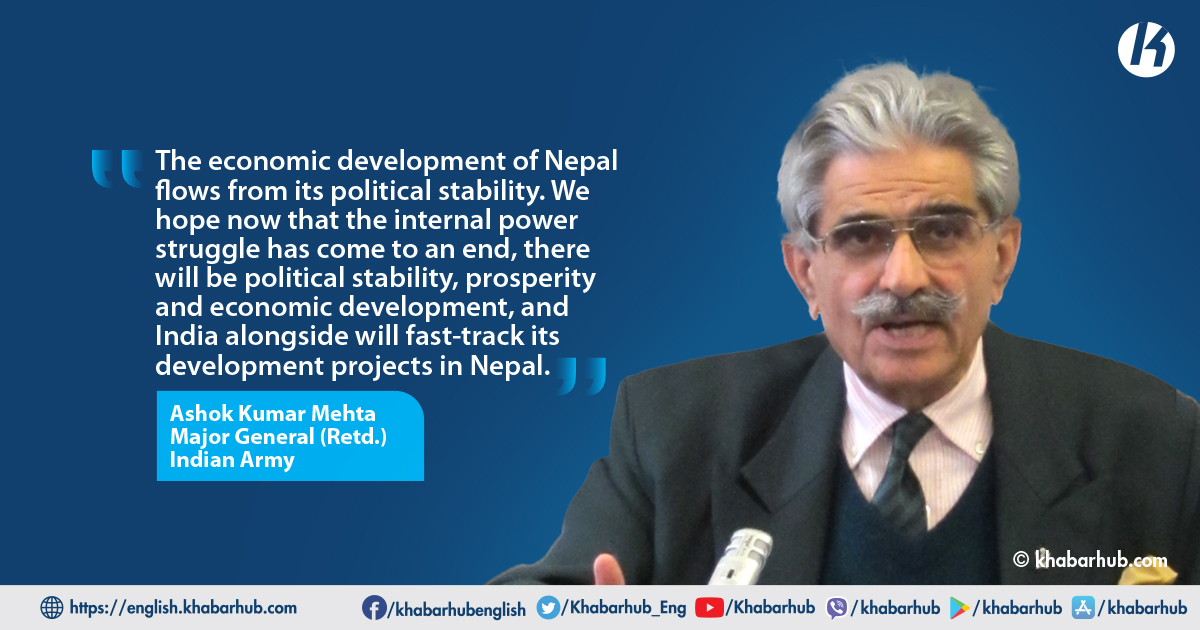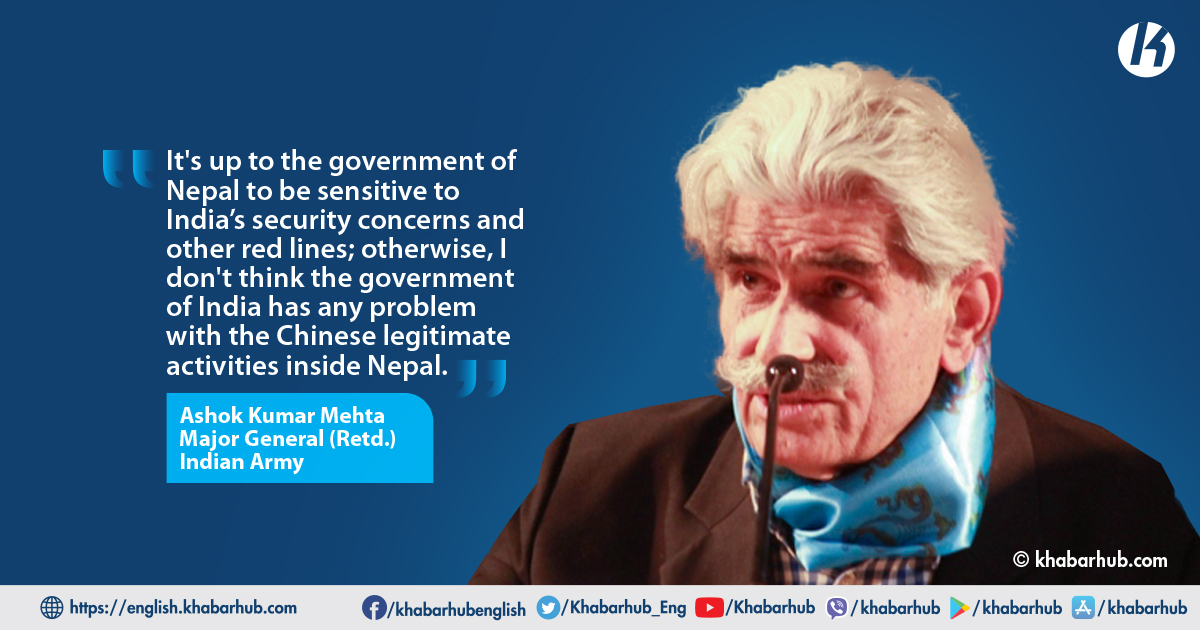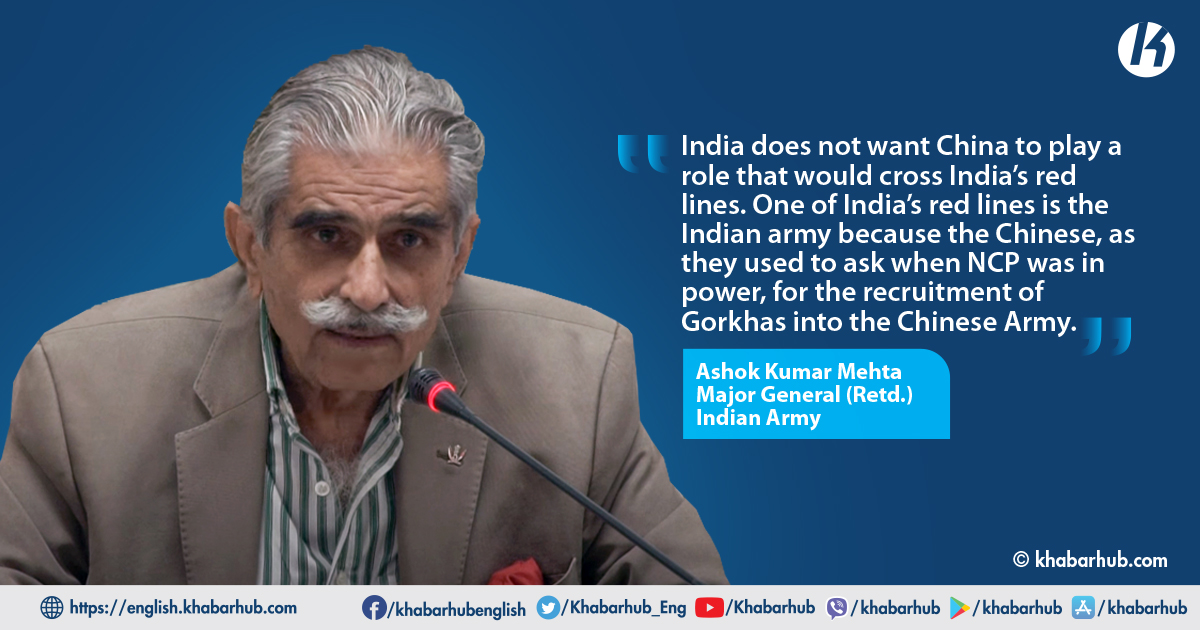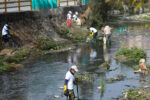Ashok Kumar Mehta is a retired Major General of the Indian Army. He writes extensively on defense matters and previously anchored Defence Watch on Doordarshan, the national television of India.
Maj. Gen Ashok Kumar Mehta is an expert on Nepal-India relations and is also a member of the India-Nepal Track II Dialogue. He is a Military commentator and has spoken and published his works across different platforms.
From the Gorkha regiment, he has also explored Nepal since 1959, walking nearly 50,000 km over the years. He has also been involved in track-I and II diplomacy with Nepal, and can speak fluent Nepali language.
Dr. Pramod Jaiswal, Strategic Affairs Editor at Khabarhub, spoke to Maj. Gen. Ashok Kumar Mehta on various aspects of Nepal-India relations.
What does the new Nepali Congress government led by Sher Bahadur Deuba mean for India? How does India plan to engage with the new government?
Any government will deal with its counterpart in another country, so India will deal with the newly elected government in Nepal. India has had excellent relations with Nepal.
Nepal is the most important country as far as India is concerned in the subcontinent. India has no favorites, India has only its national interest like Nepal does.
So India works towards its national interest and in consonance with certain values, democratic values, values of freedom and liberal democracy.
Therefore, the change of government after a long period of instability in Nepal was welcomed in India and Prime Minister Modi had called Sher Bahadur Deuba on his election as the Prime Minister for the fifth time.
Other than limiting China’s influence in Nepal, at the moment, what may be India’s priorities in Nepal?
India’s number one priority when it comes to Nepal, obviously at this time of the COVID19 pandemic, is to ensure that Nepal is free [of COVID19] as soon as possible under the present conditions of the pandemic.
Prime Minister Narendra Modi had held his first conference in 2020 between the SAARC countries on COVID19. India has tried to help Nepal in terms of equipment from the government to the government level.
Likewise, there is also a separate channel of government to the Nepal Army, as the India and Nepal army share a unique and very special relationship, so there is a channel that deals with this.
Overall, the priority is to assist Nepal in combating the COVID-19 epidemic. Unfortunately, in the last six to eight months, India has not been able to help with vaccines because of the shortages in India itself.
India has been unable to keep its promises to other countries because it was swarmed by the deadly second wave which is just about now receding. So, contrary to its intentions, it was unable to meet its commitments on providing vaccines to Nepal.
However, as soon as the situation improves that deficiency will be managed. The other priority is the economic development of Nepal.
The economic development of Nepal flows from its political stability. We hope now that the internal power struggle has come to an end, there will be political stability, prosperity and economic development, and India alongside will fast track its development projects in Nepal.
Thus, the number two priority for India is to help Nepal boost its economy by helping it through aid and economic system projects, which were not moving as far as necessary.
There is a perception in Nepal that towards the end of his tenure, KP Sharma Oli had taken India into confidence to sustain in power. Had Oli resolved his differences after the high-level visits from India to Kathmandu in 2020?
Well, I think it’s the other way round. It’s India that took the initiative, India sent its RAW Chief to Nepal followed by the Army Chief and the meeting between the Ambassadors, the conversations between K.P Sharma Oli and Prime Minister Modi.
So, the initiative was largely taken by India to improve relations between the two countries. Prime Minister Oli does not have a very favorable track record in the Indian copybooks because of the Kalapani issue and for resorting to ultra-nationalism on the basis of constitutional issues and economic blockade.
After the Kalapani issue, there were a number of anti-India issues about what India was doing. And finally, Prime Minister Oli got the constitutional amendment on the new map of Nepal.
But overall, the matters have not been resolved. The Kalapani issue has not been resolved. There has been no foreign secretary-level dialogue that should have taken place.
Other issues, smaller in relation to the border issue, should also have been resolved. But due to the COVID-19 pandemic and the political instability in Nepal, none of that has happened.
I do believe now that the situation is different and there is considerable political stability and some of these issues may begin to be discussed at various levels including from Government to Government.

It’s been more than three years since EPG finalized a joint report with recommendations aimed at redefining the Nepal- India bilateral ties. However, the group hasn’t been able to present its report to the prime ministers of both countries. It has created lots of noise in Kathmandu. Where does the contention lie?
I think the EPG issue is the most tricky issue between India and Nepal. It was in 2011 when Baburam Bhattrai was the Prime Minister, the idea of an EPG was mooted but was formed much later.
In 2015-16 with a two to three-year mandate, after they had some 300,000 dollars and 9 and a half meetings later they were able to resolve the issue.
In fact, they had produced a joint report and according to one or two signatories, there was a surficial consensus on the report. But if you scratch the surface, there were differences, and I think the main difference was in the 1950 treaty.
There were certain issues or clauses and articles of the treaty that Nepal wanted to change. Nepal wanted the 1950 treaty to be more contemporary.
It was from 1950, almost 65 years now, so it needs to be changed. But as I have mentioned in the beginning, it is a very sensitive issue. For India, anything to do with Bhutan, Nepal and once Sikkim, the three border states, were crucial for its security considerations.
When Chakra Prasad Bastola was the Foreign Minister of Nepal, he had set up a joint working group on it with foreign secretaries from both sides.
Late Mr. Bastola told me that the government of Nepal was not too keen to make alterations to the treaty. Pashupati Shamsher Jung Bahadur Rana of the Panchayat regime once told me when I interviewed him in the 1990s regarding the 1950 treaty, [said] that as far as the 1950 treaty is concerned, let sleeping dogs lie.
That’s how we ended it. But my own view is that the EPG report must be addressed and again it is for political reasons that the government of India has not dealt with it. One of the EPG leaders from the Indian side is a governor in Bombay.
We already have a lot of problems between India and Nepal. And if you bring up the EPG at such a time it will raise hoarseness but that doesn’t mean the issue or EPG report will be suppressed. It will come into discussion and I believe that next year we will hear about the EPG report after the political stability in Nepal.
I have had meetings with Bhek Bahadur Thapa who was the leader on the Nepali side of the EPG, in fact, I met many members and I have no doubt that both sides want the issues raised by the EPG in the main 1950 treaty to be resolved and I’m sure it will.
There was not a single visit by Indian Prime Minister Manmohan Singh during his decade-long tenure while PM Modi has made four official visits to Nepal in four years. Has India prioritized Nepal in recent times?
Yes, but I personally don’t think we should judge the importance of the relation between two countries only and alone by the number of visits the Prime Minister has made.
Some years ago, I had written specifically on this issue that there was no visit from the Indian side for 16 years but I had pointed out then and I will point out again that for India, Nepal is the most important country for India.
When Modi became the Prime Minister, one of the first countries he visited was Nepal, and Nepal has been visited four times by Prime Minister Modi.
This itself indicates how important Nepal is, after all, Nepal is like the “Tauko” [head] of the Indian subcontinent, right at the head is Nepal and the body of the subcontinent is the rest of India.
There is no question of prioritizing, as for India, Nepal is number one and will remain number one. We should not judge the importance that India assigns to Nepal merely by how many visits the Prime Minister has made.
How do you look at the recent visit of Bharatiya Janata Party (BJP) Foreign Department Chief Dr. Vijay Chauthaiwale’s visit to Kathmandu?
Although Mr. Chauthaiwale’s official title is Foreign Policy Cell in Incharge or leader of BJP, he is also the Public Relation (PR) manager of Prime Minister Modi.
So, during all of PM Modi’s visits abroad for NRIs whether it was Silicon Valley or London, or Toronto, Mr. Chauthaiwale spent all his energy organizing the NRI meetings.
But having said that, Mr. Chauthaiwale is a professional and together with Mr. Ram Madhav, they are coordinators. Mr. Chauthaiwale is from RSS and he operates below the radar. But I see from the Nepali media that his visit was recognized as a very important event.
So, it’s good that at the present moment when no physical visits have taken place during the pandemic, except for the Army chief and the RAW chief, this is the first political visit. But it has taken place from the party and not from the government. It’s an important event and we should recognize it as that.
Why is India always caught in controversy while signing any agreements with Nepal?
That’s not true! We’ve signed many agreements that have been fortified, the oil pipe, the integrated check post and a lot of others.
What you are referring to is in the past. As people in Nepal say “Yo Woohileko Kura Ho!” [It’s an old issue]. But the attitude and the approach have changed. If you see in the last 3 or 4 years, there is a sea change in the manner of addressing the new agreements and projects.
In the past, the main hiccup was in the hydropower electric projects and most complaints were about projects not starting, projects going beyond timeline and the time and cost because the hydro issue involves a lot of kickback and it is held very close to the party or government in power.
Especially during the 10-year insurgency in Nepal, many of the hydro projects that India wanted to complete or start were interrupted by the Maoists themselves. They would come and occupy the sites, preventing workers from reaching there, so there were interruptions.
However, you would have noticed that in the recent past, there is a change because India realizes that it is not the only player in Nepal.
India is competing with other players in terms of quality, delivery, time and cost lines, so India has to perform better. As enumerated earlier we’ve made a lot of improvement in the delivery of many of the agreements that have been signed and that will be signed in the future.

In September 2019, a 69 km cross-border pipeline between Nepal and India was inaugurated. It was completed 15 months ahead of schedule and is the first of this kind in South Asia. What went wrong with previous Indian development projects in Nepal? Why have many Indian development projects long-delayed in Nepal?
The 69 km cross-border pipeline which resulted in the cost of fuel that was delivered to Kathmandu, was reduced by Rs 2 or a substantial amount.
This was due to the nature of the project, the forward-thinking in the project and the fast delivery. And it’s for this reason that India is now competing not just with other players but the Nepalese expect India to provide quality goods, quality service, on time and in good order. And I think it’s a change of attitude.
You can see this from the way the government-to-government relationship has changed in the last 3 or 4 years. India is no longer micromanaging things as was the complaint earlier. India is no longer dealing only at the bureaucratic level, there is political engagement between the two countries.
And without political direction and engagement, delivery cannot be as efficient and effective if left to only bureaucracy, which was the case in the past. So, things have changed for the better.
At the time when India and Nepal are struggling with COVID19, how can India help Nepal in vaccinating the Nepali people through India’s Neighborhood first policy and Vaccine Diplomacy?
India and Nepal have a unique open border, nowhere else in the world, not even Canada and the United States, do you have an open, virtually unregulated border. Nepalis and Indians move freely, goods move freely, people move freely.
This is one of the greatest virtues of the 1950 treaty. People of Nepalese domicile are able to access India in jobs, in buying land, in employment, and by joining the army. This is unique and nowhere else in the world do you have this example of cross-border movements.
Therefore, if there is a rise in India that rise obviously travels to Nepal and vice versa. But more will be from India to Nepal because India has a larger population.
And when Nepalese return home for festivals or whatever, the COVID19 travels with them. For India and Nepal and the rest of SAARC, there has to be integrated vaccine diplomacy.
And India has to go all out to help Nepal to address this problem of COVID-19. India is now seeing the declining phase of the deadly second phase of COVID-19.
There are some reports of a third phase, but keep your fingers crossed because in Nepal festival seasons are right around the corner, so let’s pray to Lord Pashupatinath that this COVID19 stays at a low level, and eventually, India can help Nepal to combat this menace for good. But that may take some time.
What are Indian concerns in Nepal in relation to China?
China, during the period of the monarchy, used to openly tell Nepal to go along with India and till 2006, the Chinese were helping King Gyanendra to fight the Maoists and they had used many unfavorable slogans against the Maoists as hijackers, anti-state insurgents and generally criticizing the Maoists.
And then there was a change once Maoists came into power, there was a dual transformation amongst the Chinese, one, they used to say they will not interfere in the internal affairs of Nepal and two, their assistance programs increased dramatically after the left alliance government came into power.
So, the Chinese position has changed considerably and they were the ones who were able to bring the left alliance into a reality and for the first time in Nepal’s democratic history enabled a nearly two-thirds majority of some 173 seats of the Nepal Communist Party.
And unfortunately, all that has disintegrated for the time being, because in politics anything can happen. So as far as India is concerned, India does not want China to play a role that would cross India’s red lines.
One of India’s red lines is the Indian army because the Chinese, as they used to ask when NCP [Nepal Communist Party] was in power, for the recruitment of Gorkhas into the Chinese Army.
Otherwise, the Chinese should assist Nepal in its development, after all, Nepal is a bridge between China and India.
Unfortunately, the relationship between China and India are at their worst ever and, therefore, what Nepal wanted to do was bridge the gap and improve relations between China and India as well as take advantage of two of the fastest-growing economies.
But unfortunately, that has not come about and is unlikely to come about. But nevertheless, the Chinese are free to do what they are doing and India has no desire to embargo Chinese activity.
It’s up to the government of Nepal to be sensitive to India’s security concerns and other red lines; otherwise, I don’t think the government of India has any problem with the Chinese legitimate activities inside Nepal.








Comment